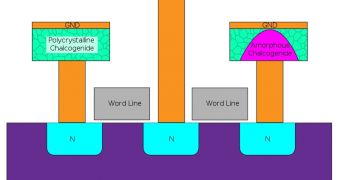SK Hynix apparently believes that IBM may have stumbled across a gold mine when it developed its brand of phase-change random access memory. As a non-volatile RAM technology, it essentially bridges the gap between random access memory and NAND.
Random access memory is very fast, but it has a problem in that it never retains information stored on it after power is cut.
Meanwhile, NAND Flash memory, as solid-state technology, retains the data, but it is not nearly as fast as RAM.
As such, though NAND has become speedy enough that it boosts system performance when used as an alternative or assistance to HDDs, it is not at the level where it can replace DDR3.
Thus, chip makers are either working to make NAND faster or enable RAM to keep a hold on the data even after the PC is shut down.
IBM has succeeded in the latter endeavor: it has dabbled in PCRAM technology, short for phase-change random access memory.
PCRAM is 100 times faster than NAND and about 1,000 times more durable. We don't need to spell out why this is advantageous.
That said, SK Hynix has signed a deal with IBM, for the licensing of the technology. Henceforth, it will manufacture and develop PCRAM for everything from consumer devices to enterprise servers.
"Phase-change memory technology has the potential to enable a new class of low-cost, high-performance memory technologies for consumer devices, cloud computing, data storage and other enterprise applications. Working with SK Hynix will speed the development and production of PCRAM devices based on our breakthrough multi-bit, phase-change memory technology," said T.C. Chen, IBM fellow and vice president of science and technology for IBM Research.
PCRAM will initially act as buffer memory, but we can definitely see a future when storage and RAM are part of the same PC component. As in a hard drive or solid-state drive that also performs all tasks currently handled by DDR3 modules. It will be years before such things emerge though.

 14 DAY TRIAL //
14 DAY TRIAL //